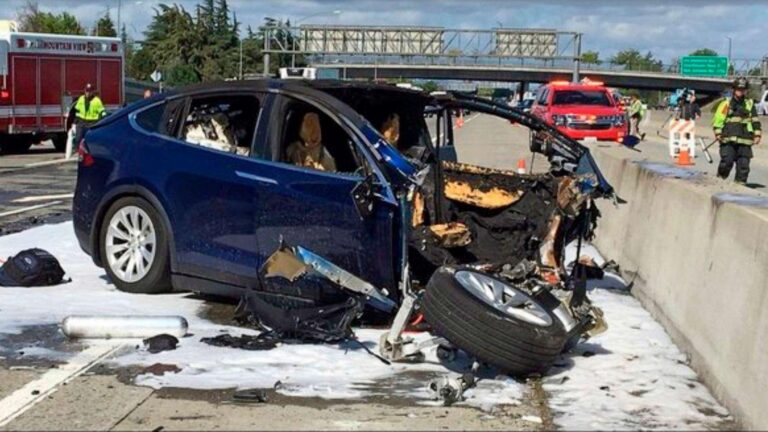A tragic accident unfolded in Germany as a Tesla vehicle crashed, resulting in the deaths of three individuals. Authorities report that a door failure contributed to the fiery wreck, raising urgent safety concerns about the electric car’s structural integrity. The incident has prompted calls for thorough investigations and renewed scrutiny of Tesla’s engineering standards.
Tesla Crash in Germany Raises Urgent Questions About Vehicle Door Safety
The recent tragedy involving a Tesla vehicle in Germany has spotlighted significant concerns regarding the safety and reliability of its door mechanisms during critical accidents. Emergency responders at the scene reportedly struggled to open the car’s doors due to mechanical failure, resulting in delayed rescue efforts that may have contributed to the fatalities. Experts emphasize that while Tesla vehicles are equipped with advanced safety features, the specific issue of door malfunction in high-impact crashes demands urgent attention from both manufacturers and regulatory authorities.
Safety analysts and automotive engineers are calling for a thorough investigation into the following key aspects:
- Emergency door release mechanisms and their effectiveness under extreme conditions
- Structural design vulnerabilities that may impede rapid passenger exit or rescue access
- Electronic vs. manual door operation reliability during power outages or post-collision scenarios
The incident has ignited debate over whether current industry standards adequately address these failings, pushing Tesla and other automakers to reassess door safety protocols to prevent similar tragedies in the future.
| Issue | Description | Potential Solution |
|---|---|---|
| Door Malfunction | Doors failing to open post-impact | Redundant mechanical release systems |
| Power Dependency | Electronic locks dependent on electrical power | Integrated manual overrides |
| Rescue Access Delay | Delayed emergency response due to door issues | Enhanced crash-resistant door design |
Investigation Reveals Door Malfunction as Critical Factor in Fatal Accident
The recent investigation into the tragic Tesla accident in Germany has pinpointed a critical door malfunction as a key contributor to the fatalities. Preliminary findings suggest that the vehicle’s door system failed to operate properly during the crash sequence, severely impeding occupant egress and rescue efforts. Experts emphasize that this mechanical failure significantly prolonged the time victims remained trapped inside the burning wreckage.
Key issues identified include:
- Door lock mechanism failure: Preventing the doors from unlocking automatically upon collision.
- Electrical system disruption: Affecting the power supply necessary for door release.
- Delayed emergency response: Due to the inability to open doors promptly, complicating rescue operations.
| Issue | Impact | Status |
|---|---|---|
| Door Lock Failure | Trapped occupants inside | Confirmed |
| Electrical Disruption | Power to door controls lost | Under Review |
| Delayed Rescue | Increased fatality risk | Confirmed |
Experts Call for Enhanced Safety Standards and Immediate Manufacturer Response
Industry experts are voicing urgent demands for stringent safety regulations following the deadly Tesla accident in Germany, highlighting critical failures that contributed to the tragedy. Analysts emphasize the need for comprehensive, mandatory testing protocols for electric vehicles, particularly focusing on structural integrity during high-impact scenarios. The failure of the vehicle’s door mechanism, reportedly trapping occupants inside, has sparked calls for automakers to prioritize fail-safe emergency exit systems and reinforce cabin resilience to prevent similar fatalities in the future.
Key recommendations from safety advocates include:
- Implementation of standardized crash door functionality tests across all EV models
- Increased transparency from manufacturers regarding safety feature efficacy
- Mandatory software and hardware updates to address potential mechanical faults swiftly
- Enhanced government oversight and quicker recall processes when defects arise
| Safety Aspect | Current Status | Expert Recommendation |
|---|---|---|
| Door Mechanism Reliability | Inconsistent under crash stress | Mandatory durability testing |
| Emergency Egress Systems | Limited failsafe options | Installation of redundant opening mechanisms |
| Regulatory Compliance | Varies by region | Unified international safety standards |
In Retrospect
The tragic Tesla crash in Germany that claimed three lives highlights ongoing concerns about vehicle safety and the critical importance of robust door mechanisms in emergency situations. As investigations continue, authorities and manufacturers alike face increased pressure to ensure that such failures do not recur. This devastating incident serves as a somber reminder of the vital role engineering and regulatory oversight play in protecting drivers and passengers on the road.




